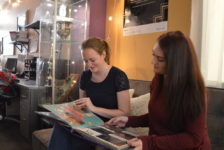
Alex Martin, a junior neuroscience major and member of the ROTC, walks down a flight of stairs in front of Converse Hall on Dec. 8. Martin said her battalion is 40 to 50 percent female—much higher than most other ROTC programs, which she said average 20 percent female. Photo by Kamarie DeVoogd.
Women have been part of Army ROTC, the Reserve Officer Training Corps, since 1976 and now constitute 20 percent of cadets, according to the U.S. Army’s website.
At Westminster College, the percentage of women is much higher, according to Kristen Hansmann, a member of the Army ROTC program who attends classes at the University of Utah.
“The University of Utah and Westminster’s Army ROTC program is truly diverse,” Hansmann said. “I would say we have about 40 percent females in our program, which is very uncommon compared to other ROTC programs.”
The Forum spoke with ROTC member Alex Martin, a junior studying neuroscience for pre-med, who said she joined the ROTC at the end of her first year of college because she could no longer afford school. Martin spoke about the gender division in the ROTC and how the program is different for female students at Westminster.
Q: What’s it like being a woman in the ROTC program?
A: Being in ROTC as a woman is interesting. Most other ROTC programs don’t have as many females as mine does, so our battalion is almost 40 to 50 percent female which is actually really high. Most of the time it is only 20 percent or below. For me, I have a little different experience, and it’s pretty positive because a lot of the females in our program are some of the best cadets, as well. When I go to other places for trainings, there is obviously a stigma that females are not as military apt in the combat army stuff, so looking at that you definitely have to overcome that bias and work twice as hard as a guy to get the same recognition.
Q: Would you say Westminster’s program is more inclusive of women than other programs are?
I would say so. The officer that is essentially in charge of our program is female and most places that is not the case. Most of the time the cadre [ROTC instructors] are all male, but we have two female cadre members. They are probably two of the most opinionated and they do the most work in the program, so we have them to look up to. They definitely make the females more included in our program, and I don’t think that is the same in other programs.
Q: Have you heard examples from students who aren’t in Westminster’s program who have seen a bigger gender division in their programs?
A: At West Point, I went to training there over the summer and the girls there I would say were very negative and they definitely were not treated equally in comparison to the guys. Looking at that, I feel like since they were held at a disadvantage and were treated differently they acted more negative toward the Army in general, and I think a lot of other programs are similar to that, too.
Q: Why did you decide to go into the ROTC at Westminster?
A: Mine was mainly the scholarship, but I had always wanted to be an Army doctor. I hadn’t really looked into ROTC or how to get into the doctor side, and then my freshman year I got done and couldn’t afford school anymore and looked into it and I’m here now.
Q: What is the most enjoyable aspect of being in the ROTC?
A: I really enjoy the structure of ROTC. It’s structured and you get what you earn. You don’t suck up to get more; you earn what you get. I like that aspect because a lot of times I think really, really good people get overlooked in the country for what they do because they don’t have all the money or they don’t have the personality that is big and bold. With the ROTC program, you can get acknowledged even if you don’t have that massive personality or money.
Q: What is the most difficult aspect of being in the ROTC?
A: The most difficult aspect is definitely the time commitment. Your first and second year are not too bad because you’re just in small classes and just learning, but once you get into your third year you are in a leadership position plus you have PT [physical training] in the morning at six. Just being able to manage your time with ROTC and with school is really difficult and that can affect your grades. It’s kind of hard because ROTC expects that ROTC is the number one priority, but you also have school, [so it’s] hard to get that even medium.










Mary Martin
Alex, we are so proud of you.! The military will be greatly enriched by the addition of women such as yourself. Your goal of becoming a military doctor is commendable. We wish you and all the women in your program the greatest of success.
Your family in Florida
druzon@comcast.net
Alex, you are a shining example for young women everywhere! Good luck in all you do!
Dorothy Ruzon (Mary Martins’s sister)